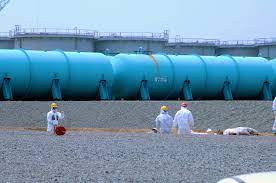IAEA Confirms Fukushima Treated Water Discharge Meets International Safety Standards
During its four-day visit, the Task Force evaluated the technical processes surrounding the ALPS-treated water release.

The International Atomic Energy Agency (IAEA) Task Force has reaffirmed that the discharge of Advanced Liquid Processing System (ALPS)-treated water from the Fukushima Daiichi Nuclear Power Station (FDNPS) aligns with international safety standards. The confirmation follows the Task Force’s latest mission to Japan from December 9 to 12, 2024.
During its four-day visit, the Task Force evaluated the technical processes surrounding the ALPS-treated water release. This included an on-site inspection of water storage tanks, emergency isolation valves, sea water dilution systems, and radiation monitors at FDNPS. The team also reviewed live data monitoring systems feeding real-time updates to the IAEA’s public platform.
Since the discharge began on August 24, 2023, this was the Task Force's third mission to Japan. It builds on the eight missions conducted during the IAEA’s multiyear safety review. In its comprehensive report, released before the discharge, the IAEA confirmed that Japan’s approach to releasing the treated water adheres to global safety benchmarks and poses negligible radiological risks to people and the environment.
Gustavo Caruso, Chair of the Task Force, emphasized the importance of continued vigilance:
"The Task Force missions ensure that we stay updated on the ALPS-treated water release and directly observe the status of the discharges. We confirm that the release continues to comply with international safety standards, and we remain committed to ongoing assessments to ensure this remains the case in the future."
Expert Participation and Monitoring
The Task Force comprises IAEA specialists and international experts from 11 countries, including Argentina, China, the United States, and the Marshall Islands. Their work spans technical reviews, environmental monitoring, and operational evaluations.
The IAEA has stationed experts at the Fukushima site since July 2023, and its on-site laboratory has analyzed the tritium concentration in the first ten water discharges conducted from August to October 2024. All samples confirmed tritium levels well below Japan's operational safety limits.
Additionally, the Task Force engaged with Japan's Nuclear Regulation Authority (NRA), the Ministry of Foreign Affairs (MOFA), and the Ministry of Economy, Trade, and Industry (METI) to discuss safety updates and address technical matters.
Broader Context and Global Collaboration
The ALPS-treated water release process is part of Japan’s broader efforts to manage the aftermath of the 2011 Fukushima nuclear disaster. Tokyo Electric Power Company (TEPCO), the plant’s operator, has been working closely with the Japanese government and international bodies to ensure the discharge meets stringent safety protocols.
Critics of the process have raised concerns about the long-term environmental impacts, particularly among Pacific island nations and environmental advocacy groups. The Japanese government and the IAEA have maintained transparency through consistent monitoring and regular reporting.
Next Steps
The outcomes from this week’s mission will be detailed in a report set for release in early 2025. Earlier reports on the ALPS-treated water release are already available online for public review.
With ongoing evaluations and a commitment to international standards, the IAEA Task Force continues to play a critical role in ensuring the safety and transparency of Fukushima’s water management process.










